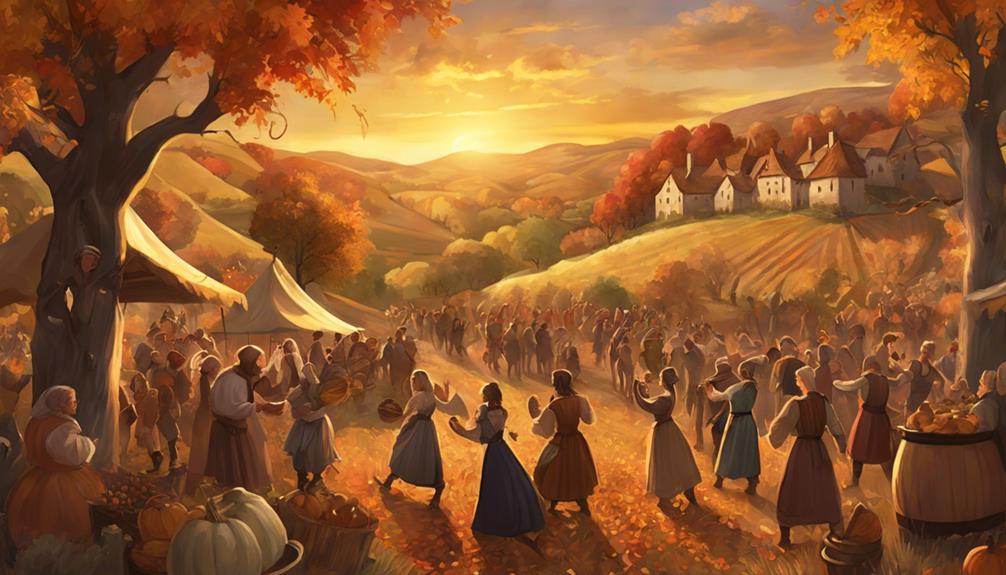You'll find that the word 'festival' originates from the Latin 'festivus,' derived from 'festus,' meaning 'joyful' or 'merry.' This Latin root is closely tied to the verb 'festivare,' which signifies 'to make merry' or 'to celebrate.' As you explore the etymology of the word, you'll discover that it underwent significant changes, being adopted into Middle English as 'festival.' The Latin influences on the modern understanding of festivals are undeniable, often tying them to religious practices and agricultural cycles. As you examine the concept further, you'll uncover the rich cultural significance and historical context that underlies the word 'festival.'
Key Takeaways
- The word 'festival' originates from the Latin 'festivus,' derived from 'festus,' meaning 'joyful' or 'merry.'
- The Latin verb 'festivare' signifies 'to make merry' or 'to celebrate,' influencing the modern understanding of festivals.
- Festivals originated from ancient rituals tied to agricultural cycles and seasonal changes, serving spiritual and cultural purposes.
- The term 'festival' underwent changes, being adopted into Middle English, and is now associated with communal celebrations and joyous events.
Etymology of the Word Festival
When you investigate the history of the word 'festival,' you'll find that it originates from the Latin term 'festivus,' which is derived from 'festus,' meaning 'joyful' or 'merry.'
This is closely related to the verb 'festivare,' signifying 'to make merry' or 'to celebrate.'
This etymological connection highlights the word's origins in ancient Roman culture, where festivities were an integral part of social life.
As you explore the linguistic evolution of the word, you'll notice that it has undergone significant changes over time.
The Latin 'festivus' was later adopted into Middle English as 'festival,' and its meaning has since expanded to encompass a wide range of celebrations and events.
Understanding the word's origins and evolution provides valuable insights into the cultural and historical contexts that have shaped its meaning.
Ancient Roots of Festivals
As you explore the ancient roots of festivals, you'll discover that they originated from rituals and practices that were deeply ingrained in the cultural and spiritual fabric of early societies.
These rituals, often tied to agricultural cycles and seasonal changes, laid the groundwork for the celebrations we recognize today.
Ancient Rituals Unveiled
Delving into the ancient roots of festivals, you'll discover that many of these celebrations originated from rituals that served as a means of appeasing gods, ensuring fertility, and marking significant events in the lives of early societies.
As you explore these ancient ceremonies, you'll find that they held profound spiritual significance, often involving elaborate rituals and sacrifices to honor deities and ancestors.
These rituals were carefully crafted to maintain balance and harmony within the community, and their spiritual significance was deeply ingrained in the daily lives of ancient people.
Roots of Celebration
You'll find that the ancient roots of festivals are deeply intertwined with the concept of celebration itself, which has its origins in the communal gatherings and rituals that brought people together to mark significant events, honor deities, and secure the well-being of their communities.
As you explore the history of festivals, you'll notice that celebration practices were often tied to the cycles of nature, with communal gatherings serving as a means to guarantee fertility, prosperity, and protection.
These early festivals were characterized by rituals, sacrifices, and offerings to deities, which were believed to maintain the balance and harmony of the community.
Harvest and Holidays
The ancient festivals that revolved around harvest and holidays not only served as a means to celebrate the changing of the seasons but also played an essential role in maintaining the social fabric of communities, with many of these early celebrations still influencing the way we observe holidays today.
As you examine the history of festivals, you'll notice that harvest traditions and holiday customs were often intertwined. For instance, the ancient Greeks would hold festivals to honor Demeter, the goddess of agriculture, during the harvest season. Similarly, many ancient cultures would come together to celebrate the winter solstice, marking the longest night of the year.
These early celebrations not only provided a sense of community but also helped to establish cultural identity and reinforce social bonds. By studying these ancient festivals, you can gain a deeper understanding of the origins of modern holiday customs.
Latin Origins and Influences
As you explore the etymology of the word 'festival,' it's clear that Latin has had a profound influence on its development, with the term 'festivus' emerging from the Latin language to describe a joyful or celebratory occasion.
In the context of Roman traditions, festivals were often tied to religious influences, such as honoring the gods of agriculture. These celebrations were deeply connected to agricultural practices, as the changing of the seasons was seen as a time of renewal and harvest.
Communal gatherings were a key aspect of these festivals, as people came together to give thanks and celebrate the cycles of nature. The Latin language's emphasis on festivus as a time of joy and celebration has had a lasting impact on the modern concept of a festival.
Middle English Definitions
As you move from the Latin origins of the word 'festival' to its Middle English definitions, you'll notice a significant shift in its etymological trajectory.
You'll need to examine the word's development in the medieval period, where its usage patterns and connotations began to take shape.
Etymology of Festival
When you investigate the etymology of the word 'festival' in Middle English, you'll find that it originated from the Old French word 'festival,' which is derived from the Latin 'festivus,' meaning 'of or pertaining to a feast.' This root word highlights the significance of festival symbolism in communal gatherings.
| Festival Aspect | Middle English Definition | Modern Interpretation |
|---|---|---|
| Origins | Derived from Latin 'festivus' | Relating to a feast or celebration |
| Communal Significance | Gathering for festivities | Bringing people together |
| Symbolic Meaning | Associated with rituals and ceremonies | Representing shared values and traditions |
As you explore the etymology of 'festival,' you'll notice the emphasis on communal gatherings and shared experiences. This understanding sheds light on the enduring significance of festivals in modern times, serving as a reflection of the power of collective celebration.
Medieval Usage Patterns
You'll find that the medieval usage patterns of the word 'festival' in Middle English reflect a nuanced understanding of communal celebrations, building upon the etymological roots of 'festivus' as a feast or celebration.
As you explore the language of the time, you'll notice that 'festival' referred to a specific type of communal gathering, often tied to religious or seasonal events.
Medieval festivities, such as harvest festivals and Easter celebrations, were integral to the social fabric of medieval society. These communal gatherings brought people together, fostering a sense of community and shared experience.
In Middle English, 'festival' conveyed a sense of joy, revelry, and collective celebration, highlighting the importance of shared rituals and traditions in medieval culture.
Evolution of Festival Traditions
The transformation of festival traditions over time is a complex, multifaceted process that reflects shifting societal values, cultural exchange, and technological advancements, ultimately redefining the essence of these communal celebrations.
As you observe the evolution of festivals, you'll notice that they've retained their core function of fostering community bonding. Festivals have always been instrumental in bringing people together, creating a sense of shared identity and collective joy.
In ancient times, seasonal celebrations like harvest festivals were closely tied to the cycles of nature. These early festivals provided a framework for community bonding, allowing people to come together and express gratitude for the changing seasons.
As societies grew and changed, festival traditions adapted, incorporating new customs and practices that continued to prioritize community bonding and communal celebration.
Cultural Significance of Festivals
Festivals have become an integral part of a culture's identity, serving as a reflection of its values, traditions, and history. It's through these celebrations that people can gain a deeper understanding of a community's collective heritage.
As you explore the cultural significance of festivals, you'll notice that they're not just entertaining events, but also serve as a means of cultural expression. Festivals provide a platform for communities to showcase their unique traditions, customs, and artistic expressions.
Additionally, they foster communal bonding by bringing people together, promoting social cohesion, and reinforcing shared values. By participating in festivals, you become an active participant in the cultural narrative, strengthening your connection to the community and its heritage.
Through this shared experience, festivals transcend mere entertainment, becoming an essential part of a culture's identity and a reflection of its collective spirit.
Historical Celebrations and Rituals
Historically, many cultures have marked significant events and seasons with rituals and celebrations that often predate modern festivals, reflecting a deep-seated human need to commemorate and make sense of the world around them. As you explore the historical context of festivals, you'll notice that ritual significance and communal bonding are recurring themes. Rituals served as a means to connect with the divine, guarantee fertility, and ward off evil spirits. These communal celebrations fostered a sense of belonging and social cohesion.
| Ritual Significance | Communal Bonding |
|---|---|
| Guaranteed fertility and prosperity | Fostered social cohesion and cooperation |
| Honored ancestors and deities | Provided a sense of belonging and identity |
| Marked important life changes | Encouraged communal participation and shared experience |
| Provided a sense of control and order | Strengthened social bonds and community ties |
Shaping Modern Festival Culture
As you reflect on the communal and ritual significance of historical celebrations, you may wonder how these early customs have influenced the development of modern festivals, shaping their cultural, social, and economic roles in contemporary society.
In doing so, you'll likely note the rise of modern festivals as sites for community engagement. Contemporary celebrations prioritize social inclusion and exchange, driving localized innovation while influencing collective behaviors and creativity.
Despite apparent temporal detachment from antiquity's hallowed values and settings, however, updated premises generally strengthen notions consistent across current domains regarding conglomeration rather than solitary narratives. This reinforces fragmented belief complexes along concurrent common ritual interfaces, maintaining efficacy dynamics that co-sublate away from regional individual fables post-absolutions, enabling other experiential meaning manifestations newly accepted and openly defining evolution parameters.
This process widens applicable horizon trajectories, moving away from limiting ensembles seen alone. It emphasizes a non-restabilishing approach that reflects openness, bringing localized fiefs, strengthening ideas for all involved deeply everywhere.
The result is a building of individual deep expressions showing long preformisms, keeping expression continuity and allowing participation in settings that are increasingly opened. This evolution ultimately leads to a greater understanding among many, shaping social spaces and providing people with the freedom to make choices that direct their celebrations.
Modern festivals, therefore, become spaces that push heritage changes and introduce new dynamics. They reflect a growing evolution and a deeper holding of cultural values, all while allowing for the expression of individuality and communal identity.
In this context, the festival horizon offers a way to think across newer realms of participation and creativity. It underscores how the act of celebration can serve as a dynamic expression of freedom, allowing individuals and communities to share their collective experiences and histories.
Through this lens, we see that festivals are not just events but are transformative experiences that involve both personal and communal growth. They provide a platform for expressing cultural narratives while adapting to contemporary social needs, thus fostering a vibrant tapestry of shared heritage and evolving traditions.
Conclusion
As you reflect on the evolution of the word 'festival,' it's clear that its meaning has been shaped by a rich cultural heritage.
From its Latin origins to its Middle English definitions, the concept of a festival has been influenced by ancient roots and historical celebrations.
Today, festivals continue to play a significant role in shaping modern culture, serving as a platform for communal expression, cultural exchange, and ritualistic practices that transcend time and geography.



